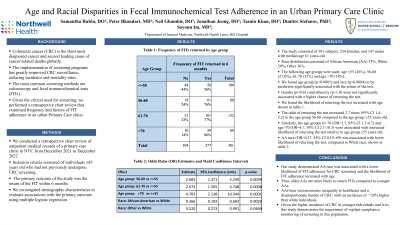Monday Poster Session
Category: Colorectal Cancer Prevention
P2148 - Age and Racial Disparities in Fecal Immunochemical Test Adherence in an Urban Primary Care Clinic
Monday, October 28, 2024
10:30 AM - 4:00 PM ET
Location: Exhibit Hall E

Has Audio

Samantha Rubin, DO
Lenox Hill Hospital, Northwell Health
New York, NY
Presenting Author(s)
Samantha Rubin, DO1, Peter Bhandari, MD1, Neil Gambhir, DO1, Jonathan Jeong, DO1, Tasnin Khan, DO1, Dimitre Stefanov, PhD2, Soyoun Im, MD1
1Lenox Hill Hospital, Northwell Health, New York, NY; 2Northwell Health, New York, NY
Introduction: Colorectal cancer (CRC) is the third most diagnosed cancer and second leading cause of cancer-related deaths globally. The implementation of screening programs has greatly improved CRC surveillance, reducing incidence and mortality rates. The most common screening methods are colonoscopy and fecal immunochemical tests (FITs). Given the critical need for screening, we performed a retrospective chart review that examined frequency and factors of FIT adherence in an urban Primary Care clinic.
Methods: We conducted a retrospective chart review of outpatient medical records in a NYC primary care clinic from December 2021 to December 2022, with inclusion criteria of individuals ≥ 45 years old who had not previously undergone CRC screening. The primary outcome of the study was the return of the FIT within 6 months. We investigated demographic characteristics to evaluate associations with the primary outcome using multiple logistic regression.
Results: The study consisted of 381 subjects, 234 females and 147 males with median age 61 years-old. Race distribution consisted of African American (AA) 135 (35%), White 108 (29%), Other 138 (36%). The following age groups were used: age≤ 55 (n=100, 26%), 56-60 (n=80, 21.0%), 61-70 (n=132, 35%) and age > 70 (n=69, 18%). We found age group (p=0.0001) and race (p=0.0084) to be the only predictors significantly associated with the return of the test. We found the likelihood of returning the test increased with age. The odds of returning the test increased 2.7 times (95% CI 1.4-5.2) in the age group 56-60 compared to the age group ≤ 55 years old. Similarly, the age groups 61-70 (OR=2.7, 95% CI 1.5-4.7) and age > 70 (OR=4.7, 95% CI 2.1-10.3) were associated with increased likelihood of returning the test relative to age group ≤ 55 years old. AA race (OR=0.37, 95% CI 0.19-.69) was associated with lower likelihood of returning the test, compared to White race, shown in table 1.
Discussion: Our study demonstrated AA race was associated with a lower likelihood of FIT adherence for CRC screening and the likelihood of FIT adherence increased with age. Thus, older AAs are more likely to return FITs compared to younger AAs. AAs bear socioeconomic inequality to healthcare and a disproportionate burden of CRC, with an incidence of > 20% higher than white individuals. Given the higher incidence of CRC in younger individuals and AAs, this study demonstrates the importance of vigilant compliance monitoring of screening in this population.
Note: The table for this abstract can be viewed in the ePoster Gallery section of the ACG 2024 ePoster Site or in The American Journal of Gastroenterology's abstract supplement issue, both of which will be available starting October 27, 2024.
Disclosures:
Samantha Rubin, DO1, Peter Bhandari, MD1, Neil Gambhir, DO1, Jonathan Jeong, DO1, Tasnin Khan, DO1, Dimitre Stefanov, PhD2, Soyoun Im, MD1. P2148 - Age and Racial Disparities in Fecal Immunochemical Test Adherence in an Urban Primary Care Clinic, ACG 2024 Annual Scientific Meeting Abstracts. Philadelphia, PA: American College of Gastroenterology.
1Lenox Hill Hospital, Northwell Health, New York, NY; 2Northwell Health, New York, NY
Introduction: Colorectal cancer (CRC) is the third most diagnosed cancer and second leading cause of cancer-related deaths globally. The implementation of screening programs has greatly improved CRC surveillance, reducing incidence and mortality rates. The most common screening methods are colonoscopy and fecal immunochemical tests (FITs). Given the critical need for screening, we performed a retrospective chart review that examined frequency and factors of FIT adherence in an urban Primary Care clinic.
Methods: We conducted a retrospective chart review of outpatient medical records in a NYC primary care clinic from December 2021 to December 2022, with inclusion criteria of individuals ≥ 45 years old who had not previously undergone CRC screening. The primary outcome of the study was the return of the FIT within 6 months. We investigated demographic characteristics to evaluate associations with the primary outcome using multiple logistic regression.
Results: The study consisted of 381 subjects, 234 females and 147 males with median age 61 years-old. Race distribution consisted of African American (AA) 135 (35%), White 108 (29%), Other 138 (36%). The following age groups were used: age≤ 55 (n=100, 26%), 56-60 (n=80, 21.0%), 61-70 (n=132, 35%) and age > 70 (n=69, 18%). We found age group (p=0.0001) and race (p=0.0084) to be the only predictors significantly associated with the return of the test. We found the likelihood of returning the test increased with age. The odds of returning the test increased 2.7 times (95% CI 1.4-5.2) in the age group 56-60 compared to the age group ≤ 55 years old. Similarly, the age groups 61-70 (OR=2.7, 95% CI 1.5-4.7) and age > 70 (OR=4.7, 95% CI 2.1-10.3) were associated with increased likelihood of returning the test relative to age group ≤ 55 years old. AA race (OR=0.37, 95% CI 0.19-.69) was associated with lower likelihood of returning the test, compared to White race, shown in table 1.
Discussion: Our study demonstrated AA race was associated with a lower likelihood of FIT adherence for CRC screening and the likelihood of FIT adherence increased with age. Thus, older AAs are more likely to return FITs compared to younger AAs. AAs bear socioeconomic inequality to healthcare and a disproportionate burden of CRC, with an incidence of > 20% higher than white individuals. Given the higher incidence of CRC in younger individuals and AAs, this study demonstrates the importance of vigilant compliance monitoring of screening in this population.
Note: The table for this abstract can be viewed in the ePoster Gallery section of the ACG 2024 ePoster Site or in The American Journal of Gastroenterology's abstract supplement issue, both of which will be available starting October 27, 2024.
Disclosures:
Samantha Rubin indicated no relevant financial relationships.
Peter Bhandari indicated no relevant financial relationships.
Neil Gambhir indicated no relevant financial relationships.
Jonathan Jeong indicated no relevant financial relationships.
Tasnin Khan indicated no relevant financial relationships.
Dimitre Stefanov indicated no relevant financial relationships.
Soyoun Im indicated no relevant financial relationships.
Samantha Rubin, DO1, Peter Bhandari, MD1, Neil Gambhir, DO1, Jonathan Jeong, DO1, Tasnin Khan, DO1, Dimitre Stefanov, PhD2, Soyoun Im, MD1. P2148 - Age and Racial Disparities in Fecal Immunochemical Test Adherence in an Urban Primary Care Clinic, ACG 2024 Annual Scientific Meeting Abstracts. Philadelphia, PA: American College of Gastroenterology.
